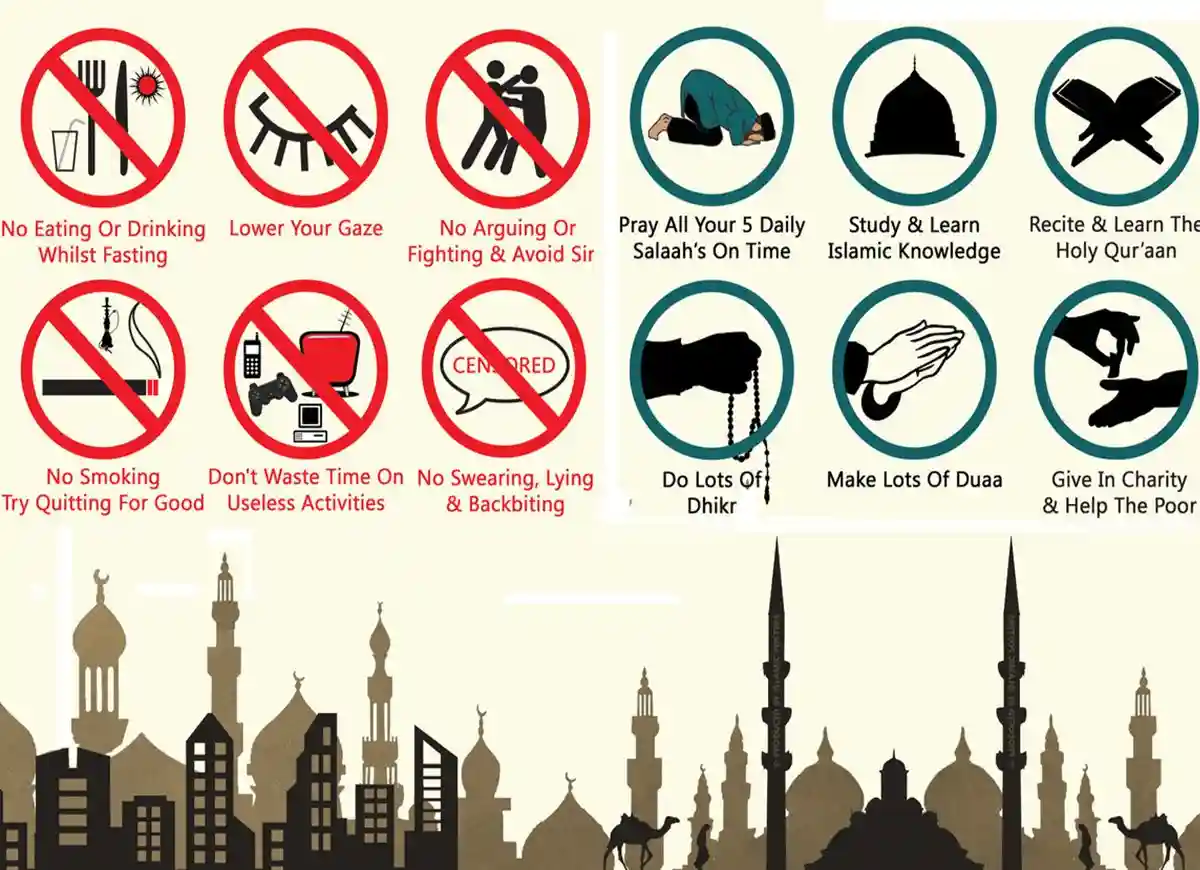We will learn in this Blog Rules of Fasting -Understanding the Shariah Principles that Govern Fasting in Islam for a Fulfilling and Spiritually Enriching Experience” Sawm, also known as Siyam, refers to the act of abstaining from specific things for a set period of time, primarily in an Islamic context.
In the religion of Islam, sawm specifically refers to the obligatory fasting during the holy month of Ramadan.
However, the concept of sawm can also be applied to voluntary fasts observed throughout the year on specific days or occasions.
Here are the key aspects of Sawm during Ramadan:
- Abstention: During Ramadan, Muslims abstain from food, drink, marital relations, and anything that breaks the fast from dawn to dusk.
- Spiritual growth: The primary purpose of Sawm is to cultivate taqwa (piety) and God-consciousness. It fosters self-discipline, empathy for the less fortunate, and strengthens one’s connection with God.
- Commemoration: Ramadan commemorates the revelation of the Quran to Prophet Muhammad (PBUH). Fasting during this month signifies gratitude and deepens reflection on its teachings.
- Community: Muslims often gather for communal meals at sunset (iftar) and before dawn (suhoor), fostering brotherhood and strengthening social bonds.
Also Read: The Holy Month of Ramzan Prayers into The Early Hours
Here are some additional points to remember:
- Exceptions: Exemptions from fasting exist for travelers, the sick, the elderly, pregnant women, and menstruating women. These individuals are required to make up the missed fasts later or engage in alternative acts of worship.
- Consult religious scholars: For specific details and interpretations regarding aspects of fasting, consulting qualified religious scholars or reputable resources is crucial.
- Variations in practice: Depending on the school of thought within Islam, slight variations in practices and interpretations related to fasting might exist.
Contents
- 1 What is Sawm (Fasting)?
- 2 Purpose of Fasting
- 3 Fasting Is Obligatory
- 4 Rules of Fasting
What is Sawm (Fasting)?
The Arabic word used to describe fasting is “sawm” in the Quran. Sawm means “to abstain”. Chapter Maryam from the Quran declares the following: Mary was the mom of Jesus, stated, “I have made a vow to keep to keep a “sawm” (fast) for the sake of the Merciful, so today I shall not speak to anyone.” [Quran 19:26].
In the words of Shariyah, sawm is the term used to avoid all items prohibited during the fasting period, from dawn until sunset, and practice this in the context of fasting.
Also Read: Taraweeh Dua in English/Arabic for Ramadan Prayers
Purpose of Fasting
In chapter 2, verse 183, the Quran states, “O you who believe, fasting is prescribed for you as it was prescribed for those who were before you, so that you may learn taqwa (piety).”
Taqwa is a highly significant term in the realm of ethics and spirituality in the Quran. The Quran is the entirety of Islamic morality and religion. It is a characteristic of the life of a person who believes that keeps them aware of God daily. Someone who has taqwa likes to do good and stay away from bad things in the name of God. Taqwa is righteousness, purity, and awareness of God. Taqwa requires perseverance and patience. Fasting helps develop patience, and one can reach the highest level of taqwa.
The Prophet (S.A.) declared that fasting serves as an effective shield. It shields one from lustful desires and sin. When the followers of Jesus were asking him to get rid of the evil spirits from his body, He is said to have said, “But this kind never comes out except by prayer and fasting.” (Matthew 17:21).
In the words of Imam Ghazali, fasting can create a sense of samadiyyah (freedom from need) within a human being. Imam Ibn al Qayyim believed that fasting was an approach to liberating the spirit of the human being from the shackles of desire, which allowed moderation to rule the self-centred Self.
Imam Shah Waliullah Dahlawi (d. 1762 C.E.) considered fasting to be a method of reducing the power of the untamed and strengthening the angelic aspects of human beings. Maulana Mawdudi (d. 1979 C.E.) was adamant that fasting for one entire month each year will educate an individual and the Muslim community in general in self-control and control.
Also Read: The Ramazan – The Month of Tolerance, Compassion, and Interfaith Harmony
Fasting Is Obligatory
In the second year of Hijrah, Muslims were required to observe fasting during Ramadan each year, as stated in the verse preceding Al-Baqarah 2:1832.83. The Quran further says, “The Month of Ramadan is when it was revealed that the Quran contains an instruction for humanity and evident indications of distinction and guidance. Therefore, anyone who observes the month must observe a fast …” (Al-Baqarah 2:1842:184.
The Prophet Muhammad (S.A.) clarified this further in a series of his statements in the works from Hadith. The Imam Al-Bukhari, along with the Imam Muslim, based on Ibn Umar, that the Messenger of God stated, “Islam is built upon five pillars:
testifying that there is no god except God and that Muhammad is the Messenger of God, performing Prayer, paying the zakah, making the pilgrimage to the Sacred House ( Hajj), and fasting during the month of Ramadan.”
The Muslim world is united in its belief that fasting is obligatory during the holy month of Ramadan. It is considered mandatory for all physically able people (mukallaf).
Rules of Fasting
Who is required to be fast?
Muslims across the globe look forward to Ramadan because it is an opportunity to experience greater happiness and peace of mind.
Ramadan is required for all adult Muslims, whether female or male, who have reached puberty and are healthful, not sick or on the move.
It could be a short-term illness that a person anticipates being cured shortly. A person who is sick should not fast during their illness. However, they should fast after Ramadan to compensate for the missing days.
People who suffer from an incurable disease and are not expecting better health can also not fast, but they are required to pay fidyah, that is, giving one day’s food for every day they do not fast to a less fortunate person. Instead of eating for a day, you can offer an equivalent amount to needy people.
Women experiencing menstrual cramps or post-natal bleeding aren’t permitted to fast; however, they can break the fast following Ramadan. Pregnant women and mothers who are nursing infants are breastfeeding; they can postpone their fast as long as possible.
A journey that is by Shariah. Shariah is any travel that is a distance from the city where you reside, at least 48 miles or 80 km. The reason for the journey should be uplifting.
It is essential to avoid any frivolous travel during Ramadan that causes one to skip fasting. It is best to alter their schedules during Ramadan so they can fast and only travel if required. Travellers who do not observe the fasts during Ramadan must make up the missing days as quickly as possible following Ramadan.
Fasting According to the Sunnah
1 – Take sahur (pre-dawn meal). Sahur will be Sunnahand. It is believed there’s a tremendous reward and blessing when you take the sahur. Sahur is best at sunrise. It is in the last 30 minutes before dawn or when it is time to perform Fajr prayer.
2 – Eat Iftar (breakfast) right following sunset. Shariah is adamant that sunset occurs when the sun’s disk is to the left of the horizon before disappearing completely.
3. 3 – During your fast, refrain from all slanderous conversations and actions. Do not argue, have disagreements, engage in arguments, use foul language, or engage in prohibited activities. Try to discipline your morality and ethics, in addition to gaining physical fitness and discipline. It is also important to display your fasting only by chatting about it a little, displaying dry lips and a full stomach, or displaying an unruly attitude. The person who is fasting should be a person of good character with a positive attitude.
4. During the fast, show charity and kindness towards others. Also, enhance your devotion and take time to read the Quran. Everyone should strive to read the complete Quran at least once throughout Ramadan.
Things That Invalidate the Fast
It is essential to refrain from taking any action that can cause your fast to be ineffective. The things that can invalidate your fast and necessitate qadar (making up for these days) include:
1 – Consuming food, drink, or smoking in a controlled manner, such as consuming any food item that isn’t nutritious through the nose or mouth.
2. Deliberately causing your body to vomit.
3. The start of menstrual bleeding or post-childbirth, even at the very last minute before sunset.
4 – Sexual interaction or any other form of sexual interaction (or masturbation) that causes an ejaculation (in males)) and Vaginal secretions (orgasm) in women.
5 – Drinking, eating, smoking, or having sexual encounters following Fajr (dawn) in the false assumption that it’s not Fajr time. I also perform these activities before Maghrib (sunset) believing it’s Maghrib time.
Sexual intercourse during fasting is forbidden. People involved must make both qada’ (make up the fasts) and kaffarah (expiation by eating a meal for 60 days in the aftermath of Ramadan or by providing 60 hungry people per day of fasting broken in this manner).
In the words of the Imam Abu Hanifah, eating and drinking in a controlled manner during fasting also results in the same Qadaa’ as well as kaffarah.
Things That Do Not Invalidate Fasting
The use of a miswak to clean your teeth will not affect fasting
In fasting, the following items are allowed:
1. Taking a bath or shower. If water is swallowed unintentionally, it won’t be a reason to break the fast. According to most Jurists, it is permitted during fasting; however, you should not dive since it can cause water to pass through the nose or mouth to the stomach.
2. Using perfumes, contact lenses, and eye drops.
3 – Taking an injection or performing A blood test.
4 – Use miswak (toothstick) or a toothbrush (even using toothpaste) and then rinse your nostrils and mouth with water, ensuring the dose isn’t too heavy (so that you don’t swallow the water).
5. Drinking, eating, or smoking in a way that is not intended, i.e., forgetting that one is fasting. However, one should stop when one recalls and keep the fast.
6 – Sleeping through the daytime and waking up to an unwelcome dream does not mean breaking the speed. If one had sexual relations at night and could not make Ghusl (bathe) before dawn, they could begin to fast and create Ghusl later. Women whose menstrual cycle is stopped at night could start fasting, even though they haven’t yet made a ghusl. Bathing (ghusl) is required in all cases, but fasting is still valid without bathing.
7 Kissing between husbands and wives is permissible during the fast. However, it is best to stay clear of it to ensure that one does not engage in any other behaviour prohibited while fasting.
Requirements for Fasting to Be Valid
There are two primary elements of fasting:
1. The goal (niyyah) to fast. Committing honestly to fasting for God’s glory each day before sunrise is recommended. The purpose should not be expressed in words; however, it should be made in the honesty of the spirit and soul. A few jurists believe that an intention should be set once throughout the month and should not be repeated daily. However, it is best to set the intention each day to benefit from the fast.
2. Abstaining from dawn until dusk of all things incompatible with fasting, as stated in the previous paragraph.
Ramazan News:
- Powerful Dua (Fasting Dua)
- Islamic Legal Rules of Fasting
- Prepare Your Household For Ramazan
- How To Enjoy Ramadan With Menstruation?
- Best Vegan Sahoor & Ifkar Recipes For Ramadan
- Ramadan FAQs: All You Need To Know About Ramadan
- What is The Celebrate Ramadan? Here are 5 Unique Traditions
- Ramadan: How To Take Care of Your Skin During The Holy Month
- Survey: Prices of Food Items Have Risen in The First 10 Days of Ramazan
Categories: PRAYER (Salat), ALMS (Zakat), SAWN (Fasting) HAJJ (Pilgrimage) & DUA (Supplications), Hadith and Tafseer, The Holy Quran, Quran Jaz 1- 114
Topics: Hijab, Arabic Corner, Islamic History, Biography, Islamic Studies, Halal & Haram








